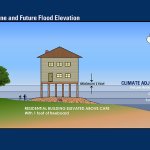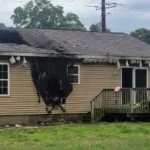OCEAN CITY – The timing could not have been more fortuitous for the climate change presentation hosted by this municipality’s library Sept. 12.
The accelerating harm of the environment was uppermost in the minds of the couple of hundred participants.
They considered the unusual wildfire activity in California because of extended high summer heat; Hurricane Florence’s threat to the Carolinas; and the unusual, historic levels of intense rain and other weather phenomena.
The focus of the event was a presentation entitled “C-Change Primer,” a non-partisan, multimedia presentation on the basic science of climate change.
C-Change Primer “has been widely hailed as an intelligent, dispassionate introduction to climate change,” according to event coordinator, Ralph Cooper, co-chair of the Atlantic-Cape May Sustainable Jersey Hub, the lead sponsor and catalyst of the event.
The program, itself, was developed in consultation with scientists, business leaders, and public policy experts working on climate change and is designed to stimulate intelligent, thoughtful and non-adversarial discussion according to a presenter, Kathleen Biggins, on this sometimes polemical problem.
According to Cooper, the C-Change team has traveled the country presenting the Primer to community groups, business organizations, planning associations, and others interested in a fair and balanced approach to the issue. Its stated aim is “to create an environment where people feel encouraged and safe to ask questions about climate change.”
Questions that the C-Change group has identified as pressing to Americans across the political spectrum have been developed by the Yale Program on Climate Change Communication.
These questions include:
* How do we know climate change is real?
* How do we know we are causing it?
* What do scientists think about climate change and its causes?
* What are the dangers of climate change?
* Is there any hope humans can address climate change?
In tandem with these questions are three main climate change themes that C-Change has highlighted as of most importance to voters and that have already seen negative impacts because of the harm from climate change: jobs and employment; health and safety; and geopolitical stress such as migration of refugees, civil strife and terrorism.
Biggins, a C-Change founding member, and volunteer presenter, focused on providing a gripping picture through charts, graphs and a decades-long, time-lapse video of shrinking polar ice of the science behind climate change and a “clear-eyed” assessment of potential risks ahead in a style accessible to all types of audiences.
According to the presentation, the world’s climate has always been changing, but these changes are rapidly and alarmingly accelerating due to human activity, especially the use of fossil fuels such as coal, gas, and oil. “We are in uncharted territory, and the situation is truly sobering. There are clear risks to continue on the path we are on now according to globally renowned academic and scientific authorities with no political agenda,” she said.
The situation, however, is not hopeless, according to Biggins, “There are many things we can do such as driving electric cars and most especially voting for leadership that recognizes we need to repair our existing infrastructure and invest in the future. Our quality of life for ourselves and especially for our children and grandchildren is in serious peril if we don’t take action now.”
To contact Camille Sailer, email csailer@cmcherald.com.
Stone Harbor – Bob Ross thank you for all your years of volunteer service to the community of Stone Harbor. A Lifelong resident And property owner. 10 years on school board, 6 years on zoning board they can't…








